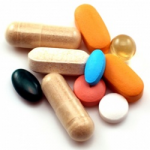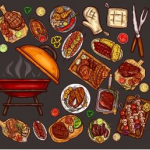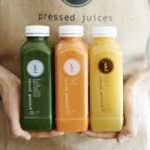Unless it's a strategic resource, like food, energy, or science, we're all for letting the free market find the best solution. If supplement hucksters can have an easier time in a dictatorship like China, this is one time we should have no problem letting communism win.
Food & Nutrition
A new study found that smokers consumed around 200 more calories per day than both non-smokers or former smokers. And that's despite eating smaller food portions. And what that means is that they engage in more snacking, and treating treats like meals.
The cost of the annual cookout is down. But as we thank our farmers we should remember that what is good for the consumer may not be as good for the producer.
Data mining genomic data is a growing trend. This study seeks to determine whether nature or nurture control who gets ill. Turns out, it's complicated, and genes may not hold all – or any – of the answers.
Who doesn't love the idea of quick and easy weight loss? Imagine being able to eat nothing but ice cream, and still losing 10 pounds. It sounds a little too good to be true, and that's because it is. Weight loss is a $66 billion dollar industry, and one of the most advertised, according to U.S. Weight Loss & Diet Control Market.
Coffee is alternately championed and derided for its health effects. A new study introduces the genetics of caffeine metabolism into the conversation.
Round. Red. Good in salads and great on a BLT. Tomatoes are a typical find in the kitchens of families in the United States, so popular we are the world’s third largest producer of them.
Though some people like to engage in the “tuh-MAY-toh” versus “tuh-MAH-toh” debate, the more popular question when it comes to tomatoes has to do with their classification. Are the circular plants vegetables or fruits?
We're going to answer that once and for all. Maybe. Because science, history, and law create a lot of confusion.
Take one article that shows sitting may be bad for you, although it is not clinically or statistically significant; multiply by very large numbers, and you have the beginning of a health meme. Spoiler alert, sitting is not the new cancer.
More than a third of kids are using dietary supplements. Due to the many preventable, adverse drug reactions they cause – such as arrhythmias and cardiovascular events – researchers set out to quantify pediatric and adolescent intake.
Despite the intentionally misleading title, soaking your nuts in chlorine isn't such a bad idea in this case. If you read about the "hygienic practices" of the Orangeburg Pecan Company, chlorine sounds pretty good. Hope you have a strong stomach.
A study of the dietary preferences of dogs and cats show distinct differences when palatability is constant. Are there lessons for us about our eating choices?
Some people claim that dairy products promote excess weight gain and even increase appetite. Obviously, there is no biological basis for this belief. Add to that, a review recently presented at the European Congress on Obesity found that dairy is not causing kids, or anyone else, to put on the pounds.











